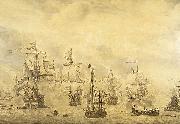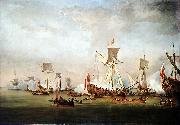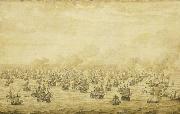|
Here are all the paintings of Willem van de Velde the Elder 01
| ID |
Painting |
Oil Pantings, Sorted from A to Z |
Painting Description |
| 91896 |
 |
Battle of the Sound, 1658. |
1660
Medium Oil and inkt on canvas
Dimensions 96.5 X 141.5 cm (38 X 55.7 in)
cjr |
| 92111 |
 |
The Departure of William of Orange and Princess Mary for Holland |
oil on canvas
Dimensions 127 X 182.9 cm (50 X 72 in)
cyf |
| 93229 |
 |
The First Battle of Schooneveld, 28 May 1673 |
1684
Medium Oil and ink on canvas
Dimensions 54.4 x 74.6 cm (21.4 x 29.4 in)
cjr |
|
|
| Willem van de Velde the Elder
|
| (c. 1611 - 13 December 1693) was a Dutch Golden Age seascape painter.
Willem van de Velde, known as the Elder, a marine draughtsman and painter, was born in Leiden, the son of a Flemish skipper, Willem Willemsz. van de Velde, and is commonly said to have been bred to the sea. In 1706 Bainbrigg Buckeridge noted that he eunderstood navigation very welle. He married Judith Adriaensdochter van Leeuwen in Leiden, the Netherlands, in 1631.
His three known legitimate children were named Magdalena, born 1632; Willem, known as the Younger, also a marine painter, born 1633; and Adriaen, a landscape painter, born 1636.
His marriage was stormy, at least in its later years. David Cordingly relates that Willem the Elder fathered two children out of wedlock in 1653, one eby his maidservant, and the other by her friend. Nine years later the Elder and his wife went through a legal separation, eon account of legal disputes and the most violent quarrelse. The immediate cause of the dispute was his affair with a married woman.e Michael S. Robinson noted that eon 17/27 July 1662, he and his wife agreed to part. A condition of the separation was that the Elder could recover from his son Adriaen etwo royal giftse, presumably gifts from Charles II for work done in England.e Cordinglyes account further relates that the dispute was still continuing after another ten years, since ein the autumn of 1672 Judith complained to the womanes husband.e Robinson adds that by 1674 the couple emust have been reconcilede, for at a chance meeting with Pieter Blaeu in Amsterdam in July the Elder explained that he was only visiting for a few days ein order to fetch his wifee. His son, Adriaen, had died in Amsterdam in 1672, and Willem the Elder was also fetching his grandson, similarly named Adriaen, who was then aged two.
After his move to England, the exact date of which is uncertain, but reportedly at the end of 1672 or beginning of 1673, he is said to have lived with his family in East Lane, Greenwich, and to have used the Queenes House, now part of the National Maritime Museum in Greenwich, as a studio. Following the accession of William and Mary as King and Queen of England, it appears that this facility was no longer provided, and by 1691 he was living in Sackville Street, now close to Piccadilly Circus. He died in London, and was buried in St Jameses Church, at the south end of the street.
|
|

